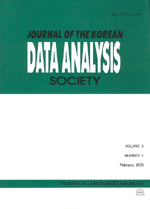ERP 시스템 서비스 품질측정에 관한 연구
A Study of ERP System Service Quality: Relationship between System Satisfaction and Job Satisfaction
- 한국자료분석학회
- Journal of The Korean Data Analysis Society (JKDAS)
- Vol.12 No.1
-
2010.02425 - 436 (12 pages)
- 8

본 연구는 ERP 시스템의 서비스 품질을 측정하고, 이들과 시스템 만족도, 직무 만족도와 관계를 분석하여 ERP 시스템의 새로운 활용방안을 제시하는데 목적이 있다. 이를 위하여 세 개의 가설을 수립하고 검증하였다. 서비스품질이 시스템만족도에 미치는 영향(가설 1)과 직무 만족도에 미치는 영향(가설 2)을 분석하였으며, 시스템만족도가 직무만족도에 미치는 영향(가설 3)을 조사하였다. 가설검증 결과, 가설 1은 ERP 시스템의 서비스품질을 측정하기 위한 7개의 변수(본원적 서비스, 예상외 부가서비스, 신뢰성, 친절성, 적극지원성, 접근용이성, 물리적 환경)중에서 3가지 변수(적극지원성, 접근용이성, 친절성)가 시스템만족도에 유의적인 영향이 있는 것으로 나타났다. 가설 2는 두 개의 요인(예상외 부가서비스 및 접근 용이성)이 직무만족도에 직접적인 영향이 있는 것으로 분석되어 부분적으로 채택되었으며, 가설 3의 검증 결과, 시스템 만족도가 높을수록 직무만족도가 높은 것으로 조사되었다. 결과적으로, ERP 시스템의 활용에 있어서 시스템 서비스 품질이 향상될수록 시스템에 대한 만족도가 개선되고, 사용자의 직무 만족도가 제고 된다고 할 수 있다.
This Study attempts to measure service quality of ERP system by using KS-SQI(Korea Standard-Service Quality Index) and also analyze the relationship between service quality and system satisfaction(Hypothesis 1), service quality and job satisfaction(Hypothesis 2), and system satisfaction and job satisfaction(Hypothesis 3) under the circumstance of ERP system operation. Of the seven variables of KS-SQI, supportability, accessibility, and hospitality are found to influence ERP system satisfaction. For hypothesis 2, unexpected benefits and accessibility have statistically significant relationship with system satisfaction. Thus, hypothesis 1 and hypothesis 2 are partially accepted. The result of hypothesis 3 showed that service quality of ERP system affects job satisfaction of user group. We can improve the performance of ERP system by improving supportability, accessibility, and hospitality of the ERP system.
1. 서론
2. 이론적 배경
3. 연구모형
4. 실증분석
5. 결론
참고문헌
(0)
(0)